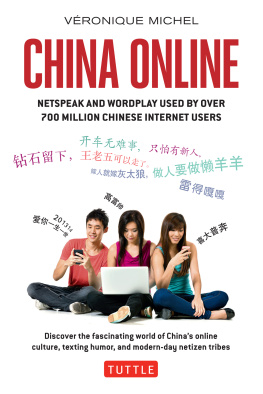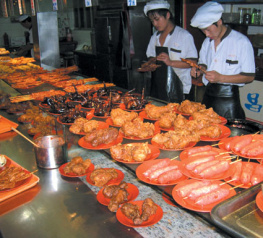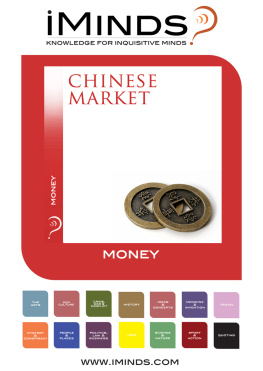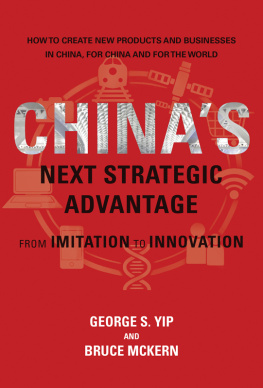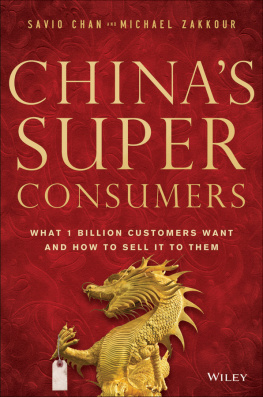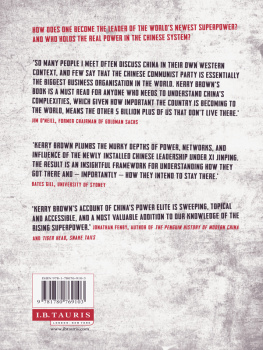Inside
the
New
China
Inside
the
New
China
An Ethnographic Memoir
Gene (E.C.) Ayres
First published 2010 by Transaction Publishers
Published 2017 by Routledge
2 Park Square, Milton Park, Abingdon, Oxon OX14 4RN
711 Third Avenue, New York, NY 10017, USA
Routledge is an imprint of the Taylor & Francis Group, an informa business
Copyright 2010 by Taylor & Francis.
All rights reserved. No part of this book may be reprinted or reproduced or utilised in any form or by any electronic, mechanical, or other means, now known or hereafter invented, including photocopying and recording, or in any information storage or retrieval system, without permission in writing from the publishers.
Notice:
Product or corporate names may be trademarks or registered trademarks, and are used only for identification and explanation without intent to infringe.
Library of Congress Catalog Number: 2009050400
Library of Congress Cataloging-in-Publication Data
Ayres, Gene.
Inside the New China : an ethnographic memoir / Gene Ayres.
p. cm.
Includes bibliographical references.
ISBN 978-1-4128-1350-1 (acid-free paper)
1. China--Description and travel. 2. China--Social life and customs--21st century. 3. Ayres, Gene--Travel--China. I. Title.
DS712.A98 2010
951.06--dc22
2009050400
ISBN 13: 978-1-4128-1350-1 (pbk)
For Tina
Dedicated to the many wonderful people I met in China, my longtime friends and family in the U.S. and Europe who remained supportive all this time, and especially those who dared to come visit us in China. Fei chang gan xie.
Contents
First and foremost, I want to express gratitude to my friend and colleague Dr. Frederick de Javanne, who first induced me to come to China, and provided the means for doing so. It was he, also, who introduced me to the woman who would become my wife, thus changing my life in two profound ways. I must also thank all those who made contributions through their words, actions and insights during my stay in China, including my colleagues Angie Qi and Janie Qiu and Chester Tian. Thanks are due also to the International Exchange Department at Harbin University of Commerce, in particular to Xu Xiao Fei and her staff, who made my stay so rewarding and comfortable, in spite of all the many challenges and obstacles. My apologies and thanks also go to those who, for various reasons, have had their names changed herein.
Further thanks are in order to my many friends, family members, and readers outside of China who followed my adventures online as I reported them and often provided invaluable feedback: my brother Dr. Robert U. Ayres, who also visited Tina and me briefly in Harbin; his wife Leslie, who literally taught me to read and love literature as a child; brothers Ed and Alex Ayres, writers in their own right; my sister Toraya Ayres who helped Tina and me through many immigration issues from afar (as well as some last-minute edits); my close friends and relatives David Meggyesy, Carolyn Silk and Jan Widgery, who encouraged me every step of the way; likewise my oldest friends Rex Hearn and Kathleen OShaughnessy; my dear friends and longtime supporters Robert and Roberta Watson; my dear friends Kevin Brady and Susan Supper who visited us in China to see for themselves; and, in no particular order Caryl and Steve Baron, Robert Lipsyte, Norman Goldberg, who first alerted me about the benzene spill, Connie Price and Dr. Jeff Nadler, Hengchun Houser, Thelma Gower, Harry Plant, Herb Snitzer, Herb Haigh, Inger Jirby, Janine Cooper, my son Jonathan Ayres who tolerated my absence, Lou and Karen Putney, Gisela Friedberg, Margo Boyer, Paul Thayer, Peter Wentz, and Susan Straight, who kindly loaned us her apartment in Kunming.
Also thanks are owed to Tom Heye who so kindly proofread my manuscript, and David Gronbeck, who read it for pleasure and provided important feedback. And finally, my thanks to my wife Tina, who put up with all this nonsense for far too long as I struggled to give meaning to what I had seen and learned in her homeland. To her it was always right under my nose and very simple: enjoy life and make do with what you have. Its a good credo and has served me well. If I missed anyone who deserves mention here my sincere apologies. Blame it on memory loss, and too much MSG.
Putting first things first, I feel it important to stress that such a book as this, coming from someone who is not well-known except perhaps among mystery readers, not a celebrity, not requiring special visas, government escorts, media attention and a security detail is exactly what makes it unique. It could never have been written if Id been a known expert, name-brand journalist, or had such a widely visible platform. The whole point is that I was allowed to live as the Chinese lived, come and go and speak and act freely among them, and do as they did for nearly three years, and I could have stayed on indefinitely had I chosen to do so. Had I been from the State Department, The New York Times, The Wall Street Journal, The Economist (all of which I dealt with or read online while there) or for that matter, Entertainment Weekly, I would not have been allowed anywhere near such access to the real China as I was given. Nor would I have had the thirty months it took to live and write this story.
In any case, history has shown that such notable position and authority may have little bearing on truth, accuracy, or outcome anyway, in geo-political matters. This is exemplified by the global financial collapse of 2008, which the leading economists, journalists, experts and politicians of the world were utterly unable to predict or prevent. (For that matter they completely missed the collapse of the Soviet Union, as well.) I therefore would hope that the reader will allow me a small degree of latitude in terms of the accuracy of my observations as to what the future might or might not hold in store for the world, in regards to China.
My working credentials that brought me to China were these: I was a published writer and author, a produced screenwriter, a TV critic (at WTSP Channel 10 in Tampa Bay, Florida), a newspaper film critic (The Berkshire Record in Great Barrington, Massachusetts), parenting columnist (The Berkshire Eagle in Pittsfield, Massachusetts), and freelance journalist who happened to be a citizen of the worlds greatest superpower at a time when native English fluency was highly desirable in China and who, based on those credentials, was invited to become an instructor at a state university there. For me it was only of passing interest and concern that this then-still-sleeping giant just happened to be the greatest power the world has ever known for approximately 95 percent of human history (for those who question this I strongly recommend reading 1421: The Year China Discovered America, by Gavin Menzies), or that it was in the process of stirring to wakefulness once again after half a millennium of fitful slumber.
The storm center of the world has shifted to China. Whoever understands that mighty Empire has a key to world politics for the next five hundred years. Secretary of State John Hay, 1899. (Thanks to Richard Holbrooke,


